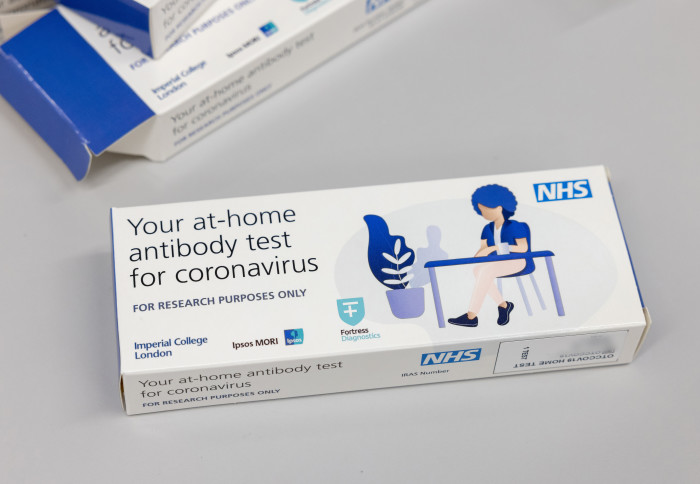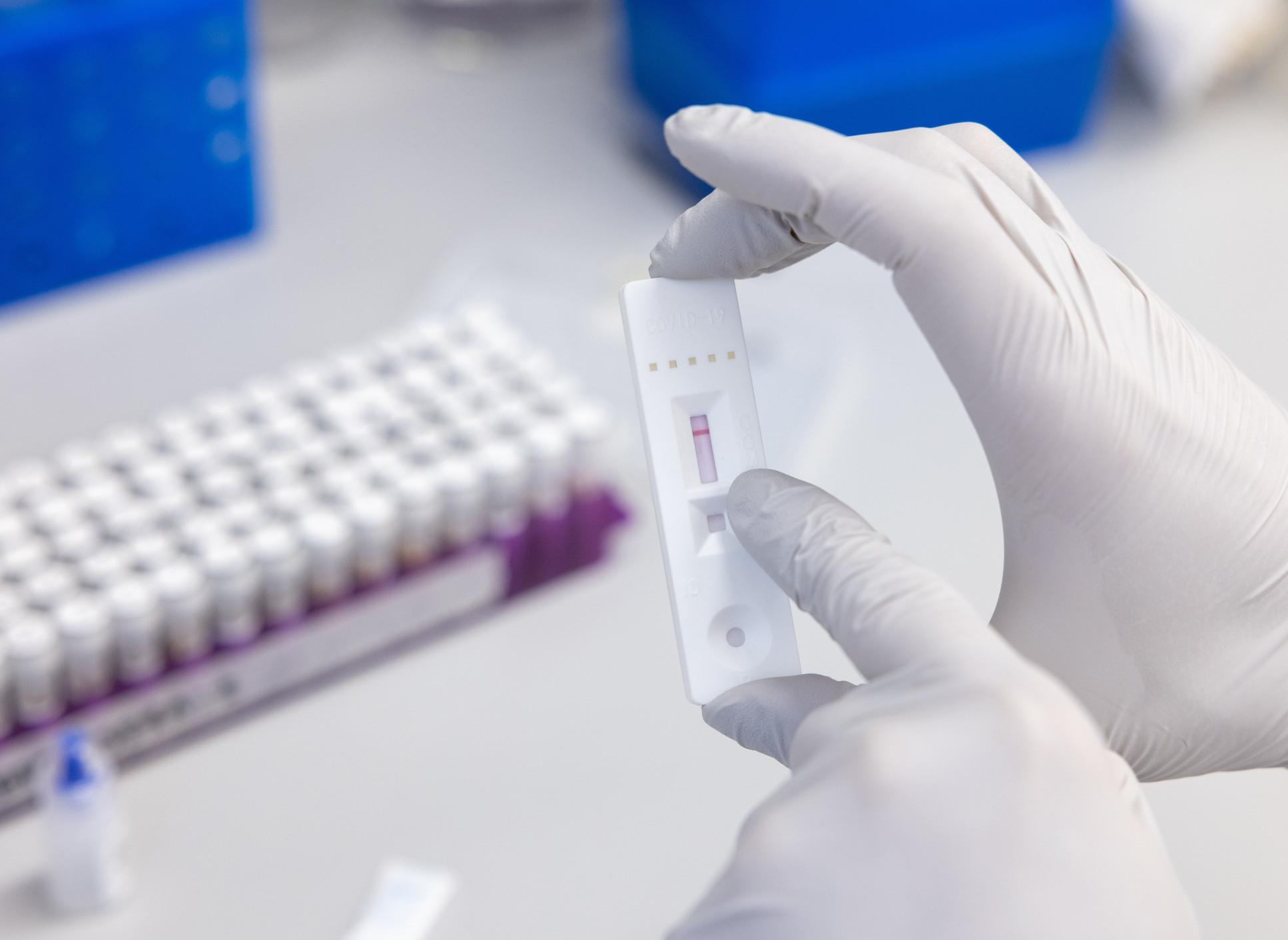

A study of 155,000 people has shown that around 14% of England’s population has evidence of antibodies against the coronavirus.
The Imperial College London-led REACT study also shows very strong vaccine uptake in England.
Antibodies are protective immune molecules produced by the body following infection and also after vaccination. Studying how many people have them can therefore reveal who has been exposed to the virus in the past while also indicating people’s antibody responses to the vaccine. However it’s unclear to what extent having antibodies, either from infection or vaccination, offers protection from getting COVID-19.
The research used finger-prick tests carried out at home between 26 January to 8th February to detect coronavirus antibodies, revealing that people in London and ethnic minorities have the highest rates of past infection.
"Our findings suggest that it is very important for people to take up the second dose when it is offered." Prof Helen Ward School of Public Health
The study also reveals important insights into vaccination with 18,000 of the 155,000 study participants having had at least one dose of a coronavirus vaccine, the majority of these being Pfizer/BioNTech. 92% of people surveyed as part of the research said they’d either had a vaccine or would take one.
Of those who had been vaccinated, overall 91% had antibodies after two doses of the Pfizer/BioNTech vaccine, rising to 95.5% in people under 60. The figure was slightly lower in people aged 80 and above at 88%.
The study also found a high proportion of people under 30 had antibodies after a single dose, with 94.7% testing positive after 3 weeks. However this figure drops steadily with age and people aged 80 plus had the lowest rates of positive tests at 34.7%.
Professor Helen Ward, Professor of Public Health at Imperial, said: “It is very encouraging to see that uptake and confidence in the vaccination programme is so high, and that most people develop a detectable antibody response after one dose. Our findings suggest that it is very important for people to take up the second dose when it is offered.
"We know that some groups have concerns about the vaccine, including some people at increased risk from COVID-19, so it is really important that they have opportunities to discuss these and find out more.”
These findings from the REal-time Assessment of Community Transmission (REACT 2) programme, carried out in partnership with Ipsos MORI, are available in a preprint report and will be submitted for peer-review.
Variations in antibody prevalence
The study used the Fortress lateral flow test to detect antibodies in a drop of blood from the finger. Tests were sent out to a random sample of the population and 155,172 people had valid results.
After accounting for the test’s accuracy and making adjustments to ensure the sample reflects England’s population (called weighting), the research found that 13.9% of people have antibodies to the coronavirus, either from past infection or vaccination. This rose to 37.9% among people who have had a coronavirus vaccine.
"We need more work to better understand the link between having antibodies and the impact on severe disease and transmission of infection." Prof Graham Cooke Department of Infectious Disease
Antibody prevalence was found to vary across the country with the highest rates found in London (16.9%). Black people were also most likely to test positive at 22.1%, followed by Asian individuals (20%), compared with 8.5% of White people.
Antibody prevalence also varied by employment, with the highest rates found in healthcare (21.9%) and care home workers (24.2%). Those in public-facing jobs such as police officers and teachers were also more likely to test positive (around 11%) than non-key workers (7.8%).
Professor Graham Cooke, NIHR Research Professor of Infectious Diseases at Imperial College London, said: “We know that antibodies are important markers of previous infection and can also help to indicate whether people are responding to a vaccine. But we need more work to better understand the link between having antibodies and the impact on severe disease and transmission of infection.”

Confidence in coronavirus vaccines
The study also used a questionnaire to explore attitudes towards coronavirus vaccines.
Responses from 172,099 people showed that confidence was high with 92% of people stating that they’d either had a vaccine or intend to do so. 6.6% of people were unsure, while 1.4% said they wouldn’t take one.
Confidence increased with age, reaching 99% in older people aged 80 and above, and varied by ethnicity, with highest rates of intention found in White people (92.6%) and the lowest in Black (72.5%) individuals. It also varied across the country with the least confidence found in London (86.8%) and the most in the South West (93.4%). And there was variation with employment with lower confidence found in care home workers (88.5%) and healthcare workers (92.1%).
"Tracking antibodies in England’s population will help guide ongoing public health measures designed to protect people." Prof Paul Elliott School of Public Health
Among those who were hesitant to take a vaccine, the most commonly cited reasons were worries about the long-term health effects or side effects, and wanting to wait and see how the vaccine works.
Professor Paul Elliott, director of the REACT programme at Imperial, said: “Tacking antibodies in England’s population will help guide ongoing public health measures designed to protect people and may also have implications for vaccination strategies.
“With the current pace and uptake of vaccination, which is very encouraging, we expect to see rates of antibodies climb across the population and we will continue to monitor this over the coming months.”
Health and Social Care Secretary Matt Hancock said: “These findings shed more light on rates of antibodies across the UK and among different groups, as we continue to strengthen our understanding of COVID-19.
“It is fantastic to see over 90% of people surveyed would accept or had already accepted a vaccine, as we continue to expand the roll-out.
“I urge anyone who has been invited for a vaccine to book an appointment. And while we are seeing rates of the virus gradually decline it is important we all hold our resolve and follow the rules as we deliver on our cautious but irreversible approach to easing lockdown.”
Kelly Beaver, Managing Director – Public Affairs, Ipsos MORI said: “It’s deeply encouraging to see such high levels of positivity towards receiving a COVID-19 vaccine among the population in our latest REACT study. That combined with our findings on the antibody response in those vaccinated show a cause for cautious optimism.”
Article text (excluding photos or graphics) © Imperial College London.
Photos and graphics subject to third party copyright used with permission or © Imperial College London.
Reporter

Justine Alford
Institute of Global Health Innovation

Contact details
Tel: +44 (0)20 7594 1484
Email: j.alford@imperial.ac.uk
Show all stories by this author



